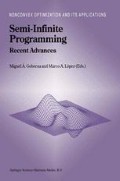Abstract
In this paper we discuss duality theory of optimization problems with a linear objective function and subject to linear constraints with cone inclusions, referred to as conic linear problems. We formulate the Lagrangian dual of a conic linear problem and survey some results based on the conjugate duality approach, where the questions of”no duality gap” and existence of optimal solutions are related to properties of the corresponding optimal value function. We discuss in detail applications of the abstract duality theory to the problem of moments, linear semi-infinite, and continuous linear programming problems.
Access this chapter
Tax calculation will be finalised at checkout
Purchases are for personal use only
Preview
Unable to display preview. Download preview PDF.
References
E. J. Anderson and P. Nash. Linear Programming in Infinite-Dimensional Spaces, Theory and Applications, Wiley, 1987.
R.E. Bellman. Bottleneck problems and dynamic programming, Proceed ings of the National Academic of Sciences of the USA, 39: 947–951, 1953.
P. Billingsley. Convergence of Probability Measures (2nd ed.), Wiley, 1999.
J.F. Bonnans and A. Shapiro. Perturbation Analysis of Optimization Problems, Springer-Verlag, 2000.
I. Ekeland and R. Temam. Convex Analysis and Variational Problems, North-Holland, 1976.
K. Glashoff and S.A. Gustafson. Linear Optimization and Approximation, Springer-Verlag, 1983.
M. A. Goberna and M. A. Lopez. Linear Semi-Infinite Optimization, Wiley, 1998.
R.C. Grinold. Symmetric duality for continuous linear programs, SIAM Journal on Applied Mathematics, 18:84–97, 1970.
R. Hettich and K.O. Kortanek. Semi-infinite programming: theory, meth ods and applications, SIAM Review, 35: 380–429, 1993.
A. Hoffman. On approximate solutions of systems of linear inequalities, Journal of Research of the National Bureau of Standards, Section B, Math ematical Sciences, 49: 263–265, 1952.
R.B. Holmes. Geometric Functional Analysis and its Applications, Springer-Verlag, 1975.
K. Isii. On sharpness of Tchebycheff type inequalities, Annals of the In state of Statistical Mathematics, 14: 185–197, 1963.
I.V. Kantorovich and G.P. Akilov. Functional Analysis, Nauka, Moscow, 1984.
J.H.B. Kemperman. The general moment problem, a geometric approach, Annals of Matliematics and Statistics, 39: 93–122, 1968.
N. Levinson. A class of continuous linear programming problems, Journal of Mathematical Analysis and Applications, 16: 78–83, 1966.
HJ. Landau (editor), Moments in mathematics, Proc. Sympos. Appl. Math., 37, Amer. Math. Soc., Providence, RI, 1987.
M. C. Pullan. A duality theory for separated continuous linear programs, SIAM Journal on Control and Optimization, 34: 931–965, 1996.
M. C. Pullan. Existence and duality theory for separated continuous linear programs, Mathematical Models and Systems, 3: 219–245, 1997.
S.M. Robinson. Regularity and stability for convex multivalued functions, Mathematics of Operations Research, 1: 130–143, 1976.
R.T. Rockafellar. Convex Analysis, Princeton University Press, 1970.
R.T. Rockafellar. Integrals which are convex functionals. II, Pacific Jour nal of Mathematics, 39: 439–469, 1971.
R.T. Rockafellar. Conjugate Duality and Optimization, Volume 16 of Regional Conference Series in Applied Mathematics, SLAM, 1974.
W.W. Rogosinsky. Moments of non-negative mass, Proceedings of the Royal Society London, Serie A, 245: 1–27, 1958.
J.E. Smith. Generalized Chebychev inequalities: theory and applications in decision analysis, Operations Research, 43: 807–825, 1995.
Author information
Authors and Affiliations
Editor information
Editors and Affiliations
Rights and permissions
Copyright information
© 2001 Springer Science+Business Media Dordrecht
About this chapter
Cite this chapter
Shapiro, A. (2001). On Duality Theory of Conic Linear Problems. In: Goberna, M.Á., López, M.A. (eds) Semi-Infinite Programming. Nonconvex Optimization and Its Applications, vol 57. Springer, Boston, MA. https://doi.org/10.1007/978-1-4757-3403-4_7
Download citation
DOI: https://doi.org/10.1007/978-1-4757-3403-4_7
Publisher Name: Springer, Boston, MA
Print ISBN: 978-1-4419-5204-2
Online ISBN: 978-1-4757-3403-4
eBook Packages: Springer Book Archive

